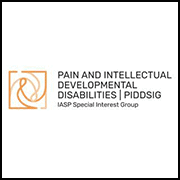This webinar was presented on June 22, 2022. Thank you to all who attended. The link to the recording is available here.
Editor’s note: Attendance is free for IASP members, though registration is still required. A registration fee of $25 is required for non-IASP members. To become an IASP member, you can join here. Trainee memberships are $50 per year, while regular memberships are $180 or $230 per year, depending on income level.
Pain Research Forum, in collaboration with IASP’s new Pain and Intellectual Developmental Disabilities Special Interest Group, was excited to bring you a webinar discussing different approaches to pain treatment in people with an intellectual or developmental disability. The webinar’s moderator, Ruth Defrin, PhD, facilitated a discussion between Tim Oberlander, MD, and Brian McGuire, PhD, who shared their experiences as clinicians and researchers working directly to alleviate pain in people with an intellectual disability. Drawing on their clinical work in medicine and psychology, they discussed a range of topics relating to the assessment and management of pain in children and adults with an intellectual disability. Registrants also had an opportunity to partake in a Q&A. The webinar featured:
- Tim Oberlander, MD, BC Children's Hospital, Vancouver, Canada
- Brian McGuire, PhD, National University of Ireland, Galway
- Ruth Defrin, PhD, Tel-Aviv University, Israel (moderator)
About the Presenters
 Tim Oberlander, MD, is a physician-scientist at BC Children's Hospital, Vancouver, Canada, whose work bridges developmental neurosciences and community child health. As a clinician, he manages complex pain in children and has a particular interest in managing pain in children/youth with developmental disabilities. As a researcher, his work focuses on studying how early life experiences associated with maternal mental illness and treatment with antidepressants shape stress/pain and related neurobehaviors during childhood. His work extends from molecular/genetic studies to population epidemiological studies characterizing neurodevelopmental pathways that reflect risk, resiliency, and developmental plasticity. Outcome measures include studies of pain reactivity, attention, mood, and executive functions across early childhood. The goal of his work is to understand how and why this happens.
Tim Oberlander, MD, is a physician-scientist at BC Children's Hospital, Vancouver, Canada, whose work bridges developmental neurosciences and community child health. As a clinician, he manages complex pain in children and has a particular interest in managing pain in children/youth with developmental disabilities. As a researcher, his work focuses on studying how early life experiences associated with maternal mental illness and treatment with antidepressants shape stress/pain and related neurobehaviors during childhood. His work extends from molecular/genetic studies to population epidemiological studies characterizing neurodevelopmental pathways that reflect risk, resiliency, and developmental plasticity. Outcome measures include studies of pain reactivity, attention, mood, and executive functions across early childhood. The goal of his work is to understand how and why this happens.
 Brian McGuire, PhD, is a chartered clinical psychologist with more than 25 years' clinical, academic, and research experience. A graduate of the National University of Ireland, Galway, he completed his clinical training and PhD at Macquarie University, Sydney, Australia. McGuire worked in the UK, Australia, and Ireland in various clinical services for people with an intellectual disability. He developed an interest in the problem of chronic pain in people with intellectual disabilities and has carried out prevalence studies in this area. He co-authored the first pain management treatment manual based on cognitive-behavioral therapy for caregivers of people with an intellectual disability. In addition to his interest in pain in intellectual disability, he is currently the director of the Doctor of Psychological Science Program in Clinical Psychology for Qualified Clinicians, and the joint director of the Center for Pain Research. McGuire is on the committee of the Irish Pain Society, and was the inaugural chair of the Irish Pain Research Network.
Brian McGuire, PhD, is a chartered clinical psychologist with more than 25 years' clinical, academic, and research experience. A graduate of the National University of Ireland, Galway, he completed his clinical training and PhD at Macquarie University, Sydney, Australia. McGuire worked in the UK, Australia, and Ireland in various clinical services for people with an intellectual disability. He developed an interest in the problem of chronic pain in people with intellectual disabilities and has carried out prevalence studies in this area. He co-authored the first pain management treatment manual based on cognitive-behavioral therapy for caregivers of people with an intellectual disability. In addition to his interest in pain in intellectual disability, he is currently the director of the Doctor of Psychological Science Program in Clinical Psychology for Qualified Clinicians, and the joint director of the Center for Pain Research. McGuire is on the committee of the Irish Pain Society, and was the inaugural chair of the Irish Pain Research Network.
About the Moderator
 Ruth Defrin, PhD, is a professor of neurophysiology from the Faculty of Medicine and the Sagol School of Neuroscience at Tel-Aviv University, Israel. Her bachelor’s degree was from the Department of Physical Therapy at Tel-Aviv University, and she received her MSc and PhD from the Department of Physiology and Pharmacology at Tel-Aviv University. She was a visiting scientist at the University of Toronto, Canada, and in the Center for Sensory-Motor Interaction, Aalborg, Denmark. She has served as chair of the Department of Physical Therapy and currently serves as the director of the postgraduate program, head of the ethical committee of the School of Health Professions, and the research chair of the Israeli Pain Association. She co-founded the Tel-Aviv University Pain Research Hub, which integrates scientists of multidisciplinary fields and clinicians from affiliated hospitals. Her main research topic is the mechanisms of chronic pain following traumatic injuries (especially spinal cord and brain injury) and following psychological trauma (especially shell shock and torture), and she is interested in the interactions between the stress and pain systems in various conditions. She is also interested in pain perception of individuals with intellectual disability and is part of EU-COST action on pain assessment in patients with impaired cognition.
Ruth Defrin, PhD, is a professor of neurophysiology from the Faculty of Medicine and the Sagol School of Neuroscience at Tel-Aviv University, Israel. Her bachelor’s degree was from the Department of Physical Therapy at Tel-Aviv University, and she received her MSc and PhD from the Department of Physiology and Pharmacology at Tel-Aviv University. She was a visiting scientist at the University of Toronto, Canada, and in the Center for Sensory-Motor Interaction, Aalborg, Denmark. She has served as chair of the Department of Physical Therapy and currently serves as the director of the postgraduate program, head of the ethical committee of the School of Health Professions, and the research chair of the Israeli Pain Association. She co-founded the Tel-Aviv University Pain Research Hub, which integrates scientists of multidisciplinary fields and clinicians from affiliated hospitals. Her main research topic is the mechanisms of chronic pain following traumatic injuries (especially spinal cord and brain injury) and following psychological trauma (especially shell shock and torture), and she is interested in the interactions between the stress and pain systems in various conditions. She is also interested in pain perception of individuals with intellectual disability and is part of EU-COST action on pain assessment in patients with impaired cognition.


